The Great God PanII. Mr. Clarke's Memoirs"Some eleven years ago, Helen V. came to the village under rather peculiar circumstances. It is understood that she, being an orphan, was adopted in her infancy by a distant relative, who brought her up in his own house until she was twelve years old. Thinking, however, that it would be better for the child to have playmates of her own age, he advertised in several local papers for a good home in a comfortable farmhouse for a girl of twelve, and this advertisement was answered by Mr. R., a well-to-do farmer in the above-mentioned village. His references proving satisfactory, the gentleman sent his adopted daughter to Mr. R., with a letter, in which he stipulated that the girl should have a room to herself, and stated that her guardians need be at no trouble in the matter of education, as she was already sufficiently educated for the position in life which she would occupy. In fact, Mr. R. was given to understand that the girl be allowed to find her own occupations and to spend her time almost as she liked. Mr. R. duly met her at the nearest station, a town seven miles away from his house, and seems to have remarked nothing extraordinary about the child except that she was reticent as to her former life and her adopted father. She was, however, of a very different type from the inhabitants of the village; her skin was a pale, clear olive, and her features were strongly marked, and of a somewhat foreign character. She appears to have settled down easily enough into farmhouse life, and became a favourite with the children, who sometimes went with her on her rambles in the forest, for this was her amusement. Mr. R. states that he has known her to go out by herself directly after their early breakfast, and not return till after dusk, and that, feeling uneasy at a young girl being out alone for so many hours, he communicated with her adopted father, who replied in a brief note that Helen must do as she chose. In the winter, when the forest paths are impassable, she spent most of her time in her bedroom, where she slept alone, according to the instructions of her relative. It was on one of these expeditions to the forest that the first of the singular incidents with which this girl is connected occurred, the date being about a year after her arrival at the village. The preceding winter had been remarkably severe, the snow drifting to a great depth, and the frost continuing for an unexampled period, and the summer following was as noteworthy for its extreme heat. On one of the very hottest days in this summer, Helen V. left the farmhouse for one of her long rambles in the forest, taking with her, as usual, some bread and meat for lunch. She was seen by some men in the fields making forthe old Roman Road, a green causeway which traverses the highest part of the wood, and they were astonished to observe that the girl had taken off her hat, though the heat of the sun was already tropical. As it happened, a labourer, Joseph W. by name, was working in the forest near the Roman Road, and at twelve o'clock his little son, Trevor, brought the man his dinner of bread and cheese. After the meal, the boy, who was about seven years old at the time, left his father at work, and, as he said, went to look for flowers in the wood, and the man, who could hear him shouting with delight at his discoveries, felt no uneasiness. Suddenly, however, he was horrified at hearing the most dreadful screams, evidently the result of great terror, proceeding from the direction in which his son had gone, and he hastily threw down his tools and ran to see what had happened. Tracing his path by the sound, he met the little boy, who was running headlong, and was evidently terribly frightened, and on questioning him the man elicited that after picking a posy of flowers he felt tired, and lay down on the grass and fell asleep. He was suddenly awakened, as he stated, by a peculiar noise, a sort of singing he called it, and on peeping through the branches he saw Helen V. playing on the grass with a "strange naked man," who he seemed unable to describe more fully. He said he felt dreadfully frightened and ran away crying for his father. Joseph W. proceeded in the direction indicated by his son, and found Helen V. sitting on the grass in the middle of a glade or open space left by charcoal burners. He angrily charged her with frightening his little boy, but she entirely denied the accusation and laughed at the child's story of a "strange man," to which he himself did not attach much credence. Joseph W. came to the conclusion that the boy had woke up with a sudden fright, as children sometimes do, but Trevor persisted in his story, and continued in such evident distress that at last his father took him home, hoping that his mother would be able to soothe him. For many weeks, however, the boy gave his parents much anxiety; he became nervous and strange in his manner, refusing to leave the cottage by himself, and constantly alarming the household by waking in the night with cries of "The man in the wood! father! father!""El Gran Dios PanII. Las memorias del señor Clarke"Hace unos once años atrás, Helen V. llegó a la aldea bajo circunstancias peculiares. Era sabido que, siendo huérfana, fue adoptada en su infancia por un pariente lejano, quien la crió en su hogar hasta que cumplió los doce años. Sin embargo, pensando que sería mejor para la niña tener compañeros de juegos de su misma edad, publicó en varios periódicos locales avisos buscando un buen hogar para una niña de doce en una cómoda hacienda. Este aviso fue contestado por el señor R., un granjero acomodado, de la aldea antes mencionada. Siendo sus referencias satisfactorias, el caballero envió a su hija adoptiva con el señor R. La joven portaba una carta, en la cual se estipulaba que la niña debería tener una habitación para ella sola y afirmaba que sus cuidadores no necesitaban preocuparse por el tema de su educación, pues ella estaba lo suficientemente educada para la posición que ocuparía en la vida. De hecho, el señor R. fue dado a entender que debía permitir a la niña encontrar sus propias actividades y pasar el tiempo como ella deseara. Puntualmente, el Sr. R. la recibió en la estación más cercana, a siete millas de su casa, y al parecer no advirtió nada fuera de lo común acerca de la niña, excepto que se mostraba reservada respecto a su antigua vida y a su padre adoptivo. Sin embargo, ella era diferente a la gente del pueblo; su piel era de un oliva pálido y claro, y sus rasgos eran bien marcados, en cierto modo, tenía un tipo extranjero. Al parecer, se acostumbró fácilmente a la vida de la granja, y se convirtió en la favorita de los niños, quienes algunas veces la acompañaban en sus vagabundeos por el bosque, ya que éste era su pasatiempo favorito. El Señor R. relata que conocía los vagabundeos solitarios de la joven, salía inmediatamente después del desayuno, y no retornaba hasta después del atardecer, y que, sintiéndose intranquilo de que una jovencita se encontrara sola fuera de la casa por tantas horas, se comunicó con su padre adoptivo, quién respondió, en una breve nota, que Helen debía hacer lo que eligiera. En el invierno, cuando los caminos del bosque son intransitables, pasaba la mayor parte del tiempo en su dormitorio, donde dormía sola, de acuerdo a las instrucciones de su pariente. Fue durante una de estas expediciones al bosque cuando sucedió el primero de los singulares incidentes con los cuales la niña está conectada, siendo aproximadamente un año después de su llegada al pueblo. El invierno anterior había sido extraordinariamente severo, la nieve se había acumulado hasta grandes profundidades, y la escarcha se había mantenido por un período sin precedente, y el verano siguiente fue igual de notable por su calor excesivo. Durante uno de los días más calurosos de dicho verano, Helen V. abandonó la casa para dar uno de sus largos paseos por el bosque, llevando con ella, como era usual, algo de pan y carne para almorzar. Fue vista por algunos hombres en los campos dirigiéndose hacia la antigua Calzada Romana, un verde sendero que recorre la parte más alta del bosque. Se sorprendieron al observar que la niña se había quitado el sombrero, a pesar de que el calor del sol era casi tropical. Mientras pasaba, un obrero de nombre Joseph W. trabajaba en el bosque cerca de la Calzada Romana. A las doce de día su hijo Trevor le llevó al hombre su comida de pan y queso. Después de la merienda, el chico, de aproximadamente siete años en aquella época, dejó a su padre en el trabajo para buscar flores en el bosque, y el hombre, que podía escucharlo gritar con deleite ante sus descubrimientos, no se sintió intranquilo. Sin embargo, repentinamente, se horrorizó al escuchar los gritos más espantosos, evidentemente producto de un gran terror, que procedían de la dirección en que su hijo había ido. Rápidamente dejó sus herramientas y corrió para ver qué había sucedido. Siguiendo su pista por el sonido, encontró al pequeño niño corriendo precipitadamente, y se encontraba, era evidente, terriblemente asustado. Al preguntarle, el hombre se enteró que el niño, luego de recoger un ramillete de flores se sintió cansado y se acostó en el pasto quedándose dormido. Fue súbitamente despertado, como relató, por un ruido peculiar, una especie de canto -así lo llamó- y, atisbando a través de las ramas, vio a Helen V. jugando en el pasto con un "extraño hombre desnudo", a quien fue incapaz de describir con más detalle. Dijo haberse sentido terriblemente asustado y que corrió alejándose y llamando a su padre. Joseph W. se dirigió al lugar indicado por su hijo, y encontró a Helen V. sentada en el pasto en el centro de un claro, o de un espacio abierto dejado por los quemadores de carbón. Irritadamente la culpó de haber asustado a su pequeño hijo, pero ella negó completamente la acusación y se rió de la historia del niño sobre un "hombre extraño", historia a la cual él mismo no le atribuía mucho crédito. Joseph W. llegó a la conclusión de que el niño había despertado con un súbito temor, como a veces les sucede a los niños, mas Trevor persistía en su historia, y continúo en aquel evidente estrés hasta que finalmente su padre lo llevó a casa, esperando que su madre fuese capaz de consolarlo. Sin embargo, por varias semanas el niño les dio a sus padres muchas preocupaciones: sus maneras se tornaron nerviosas y extrañas, negándose a abandonar la cabaña solo, y alarmando constantemente a la familia al despertar gritando: ¡El hombre del bosque! ¡Padre! ¡Padre!"
El Gran Dios Pan
Arthur Machen



































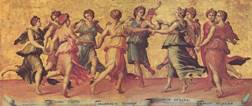










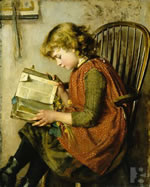




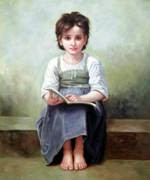














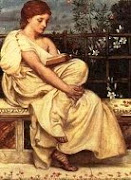

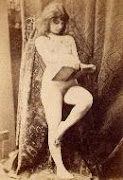














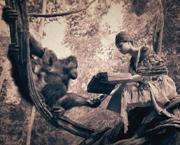





























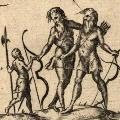


No hay comentarios:
Publicar un comentario